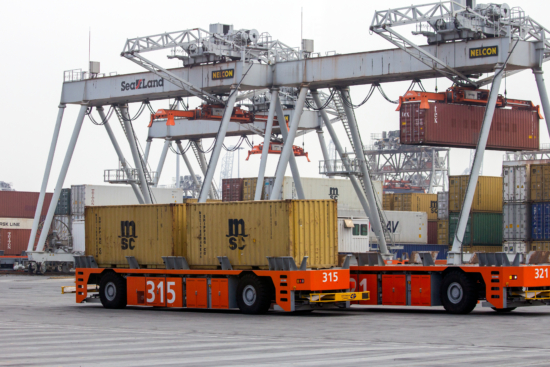moveero responds to autonomous vehicle demands
 Autonomous guided vehicles (AGVs) are increasingly being used in off-highway applications around the world (Photo: moveero)
Autonomous guided vehicles (AGVs) are increasingly being used in off-highway applications around the world (Photo: moveero)
With the use of autonomous vehicles (AVs) in off-highway applications growing rapidly, the designs of a wide range of components, including both wheels and tyres, are having to change. Indeed, in some sectors, the moveero design team has already responded to their introduction with the development of new, patented wheel technologies to meet the different requirements of these vehicles. Traditional wheel and rim designs simply may not deliver the performance requirements that are demanded by AVs. Rather than being completely new designs though, AVs generally require wheels that deliver increased durability, strength and longevity, with existing designs and processes evolving to provide solutions that meet these demands.
In off-highway applications, autonomous guided vehicles (AGVs) are widely used in ports around the world. In such environments, the vehicles operate 24 hours a day and handle extreme loads. Working autonomously, each vehicle’s movements are fully integrated into a carefully choreographed programme, often involving fleets of more than 40 AGVs working in harmony across a location. The impact of a failure on any one AGV therefore has a dramatic and very rapid impact on the operation of the whole port.
Standard wheels are simply unable to cope with this so moveero’s R&D team report that they have worked closely with OEMs, tyre manufacturers and port authorities to “develop solutions to meet their needs, developing a wheel better able to cope with the increased stresses and so with significantly more resilience to fatigue.”
Gianpietro Bramé, Chief Engineer, Europe at moveero, commented: “Through process innovation, our patented Infini-Forge wheel was developed specifically to the needs of AGVs. The wheels are manufactured through a hot induction forming (HIF) process, which makes them stronger and with a lifespan typically double that of conventionally manufactured, multi-piece wheels.
“The manufacturing process allows great design freedom whilst achieving greater manufacturing accuracy, enabling material to be placed only where it is needed. This results in an increase in rim strength without a significant increase in weight.”
Infini-Forge is one example of wheels that are developed to help solve specific sector-specific demands. Gianpietro Bramé continued: “A further evolution is likely to be in the development of tools for condition monitoring, with sensors for crack detection alerting port operators to the need for preventative maintenance, and load sensors capturing live loads of the vehicles. We have already carried out a good deal of work in this area, collaborating with manufacturers and academia to develop solutions.
 “This technology will be invaluable to ports but will also help AVs in other sectors, including underground mining, where the risk of a vehicle failing three miles underground is an obvious barrier to their wider use in these environments. Clearly if preventative maintenance can be accurately predicted, then vehicles can be taken to the surface at the right time, rather than waiting for a failure to occur.”
“This technology will be invaluable to ports but will also help AVs in other sectors, including underground mining, where the risk of a vehicle failing three miles underground is an obvious barrier to their wider use in these environments. Clearly if preventative maintenance can be accurately predicted, then vehicles can be taken to the surface at the right time, rather than waiting for a failure to occur.”
In other sectors, such as agriculture, the use of AVs is more complex, and some fundamental questions remain. On farms, the environment is much more varied and the terrain more unpredictable than in a port or mine. It is also less likely that farmers will undertake continuous 24/7 operation and so the challenges for AV suppliers and wheel and tire manufacturers will be quite different to those posed by the mining and material handling sectors.
If AVs are used, “they will likely be for tractors, to help free up farmers’ time and reduce the impact of labour shortages. Or they could be deployed for specific operations which are perhaps more predictable and/or work in tandem with traditional vehicles, for example harvesting, where an AV could follow a combine during harvesting, collecting and transporting the crop”, moveero representatives concluded.

 Bridgestone
Bridgestone

Comments